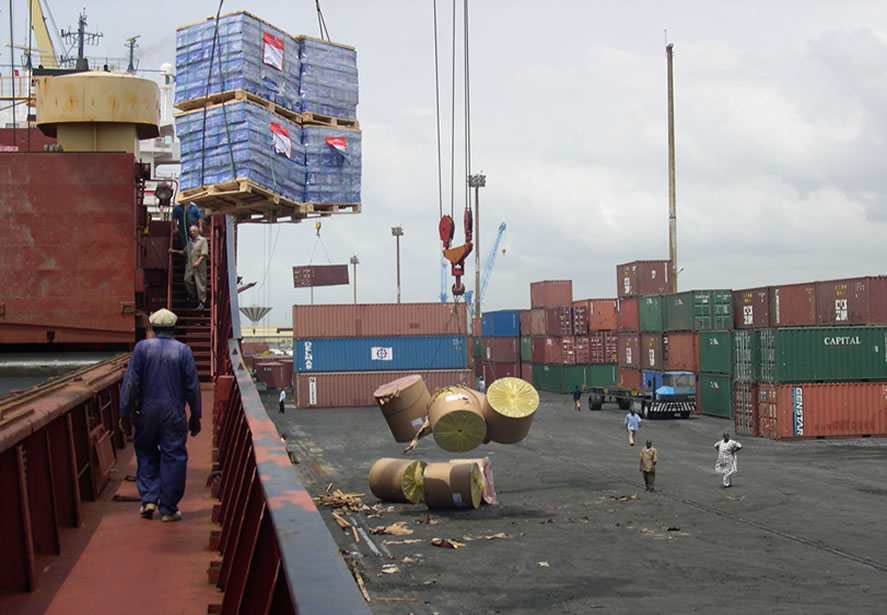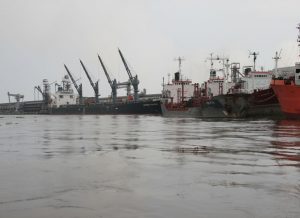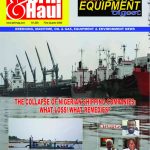The Collapse of Nigerian Shipping Lines: What Loss! What Remedies?
by Edmund Chilaka
(first published 1st Quarter 2009 edition)
The fortunes of Nigerian sea trade today are hanging in the balance: a balance crafted knowingly or unknowingly by the former administration of President Olusegun Obasanjo coupled with the weak management structures of the operators. The announcement suspending cargo support for Nigerian shipping lines took a few minutes in one day but the ill effects of that singular measure sounded the death knell of the indigenous maritime industry and has, so far, shut the doors of many companies and sent countless workers home due to lack of business. Some have been sent to their early graves.
Before the onset of the Olusegun Obasanjo administration in 1999, it is undisputable that the Nigerian shipping industry, made up of mainly private shipping companies, was still alive, if not doing relatively well. Despite teething problems, the industry continued to plod on, even though foreign shipping lines gave them suffocating competition. A lot of the container cargo market was off limits but in general goods, export and project cargoes, Nigerians were holding their own. They were well off compared to today when scarcely a healthy indigenous shipping line doing foreign voyages can be found. We must ab initio say that the Nigerian National Shipping Line had been almost fully liquidated by 1999, leaving the terrain with private sector companies. Some of the them were recognized by the National Maritime Authority (NMA), the precursor of the present Nigerian Maritime Administration and Safety Agency (NIMASA), as indigenous carriers like Globe Shipping, Haastrupp Lines, Cloverleaf Shipping, Ocean Steamship, Interglobal Maritime Services, Nigeria-America Line, etc. Others were higher in status and were called national carriers like the Nigerian National Shipping Lines (NNSL), Nigerian Green Lines, Bulkship Nigeria Ltd, Africa Ocean Lines, Brawal Lines, Genesis Worldwide Shipping, etc. Some had ships, like Bulkship (2), Nigerian Green Lines (1), NNSL (23), Brawal Lines (2), Africa Ocean Lines (3), Genesis Worldwide Shipping (2), etc. But the majority of Nigerian shipping lines were heavily into ship chartering to carry their cargo allotments, so that even those that possessed fully owned ships had to charter many others in order to satisfy the demands of the traffic. So busy was the indigenous maritime scene that many Nigerian shipping lines were chartering up to 10 to 14 ships on a monthly basis. It must be said that when the NMA was commanded by the federal government in 1994 to give loans totaling not less than $73 million to selected Nigerian shipping lines, this singular action bolstered their operations in international tramping operations and raised the profile of the Nigerian flag in world shipping. But alas, that was the highpoint of the occasion.
This supplement will focus mainly on the activities of Nigerian indigenous shipping lines in the sphere of international cargo haulage, ship ownership and chartering, general ocean trading and related ventures. There was, as still remains to date, a vibrant ship agency business, strongly rooted in the hands of indigenous operators. Local chandlers, dealers in bunker, marine insurance and ship repairs are still present in the scheme of things but in each sub-sector, progress and development must be judged on a case-by-case basis and based on demand by both the local and international shipping markets. In this edition, we shall focus on the antecedents of Nigerian ocean shipping to discover the trail of events that led to the decline of this once-thriving sector and especially the immediate factors that precipitated that sharp decline and the diversion of remaining operators to other sundry ventures. Interviews of top notch professionals have been included in the supplement to give a rounded perspective to an understanding of these momentous period in the history of Nigerian maritime industry.
The National Shipping Policy and the emergence of many shipping lines
With the inauguration of the National Shipping Policy in 1987 and the onset of the NMA, Nigerian maritime operators were emboldened to venture into international shipping business. The NMA enabling law, Decree 10, made several encouraging provisions, especially the reservation of cargo, just like the practice in most maritime nations, to encourage Nigerian citizens to begin to participate in shipping. In fact, the mantra of the NMA became “improving the participation of Nigeria in international shipping”. This, the Authority tried to do in diverse ways. By the 10 th anniversary of NMA in 1987, over thirty shipping lines and many shipping agencies could be counted as registered indigenous shipping operators. The shipping lines hoped to benefit from the generous cargo provisions of the NMA enabling Act.
The provisions of Decree 10 stipulated that Nigerians shall have a right of affeightment of up to 50% of all dry cargoes originating from international commercial ventures in which the local, state and federal governments of Nigeria were involved. Foreign shipping lines shall be entitled to the rest 50%. For wet cargo like petroleum products, Nigerian shipping lines were given a provisional cargo reservation of 100% to be carried by Nigerians in owned or chartered tonnage. The tradition of cargo sharing between nations was initiated by the spirit of the United Nations Conference on Trade and Development recommendations binding world maritime nations at the time. It stipulated that a cargo sharing formula must be adopted so that stronger nations do not oppress the weaker developing ones. That formula was 40:40:20. Nigeria’s shipping policy recognized this UNCTAD code but improved on it and the administration of President Ibrahim Babangida has the singular credit of being the only one that ever hearkened to the clamour of indigenous shipping lines to protect the local industry like many other nations. But the foreign shipping lines hated the institution and operations of the defunct NMA. Their major grouse was mainly twofold: They resented having to pay 3% of all freight earned while carrying cargo that has a Nigerian economic foot print. In other words, for bringing ships to discharge at the nation’s seaports and enjoying the services and protection of the Nigerian commonwealth during their sojourn, a practice in all nations, they were to pay a royalty, according to this law which they resented. This law applied to all, Nigerians and foreigners alike. The second grouse of the foreign shipping lines concerned the reservation of cargo for Nigerian shipping lines. They contended that Nigerian shipping lines were so only in name; that in reality these companies would only corner allocated cargo and resell same to either foreign shipping lines or to other capable Nigerian shipping companies. They resented that commissions were being charged by these Nigerian companies which posed as “middlemen”. That this practice was real cannot be contested. That it was a justification to suspend the laws of the land was just pedestrian, myopic and self-serving, and no regime since Babangida formed the NMA in 1987 ever listened to the whining of these mainly European buccaneers and their Nigerian fellow-travellers who sit in their boards. Such a no love-lost relationship continued until they waylaid the administration of President Olusegun Obasanjo and snatched the prize cunningly, leaving the indigenous sector comatose as it is today.
President Obasanjo’s track record in the maritime sector.
It can be argued that the Obasanjo administration had quite a few achievements to its credit during the eight years of its tenure from 1999 to 2007. Those enamoured to his administration will mention, first and foremost, the GSM telephone which materialized under his tenure. Then they will remind us that he paid off Nigeria’s multi-billion-dollar indebtedness to the IMF and World Bank, etc. Even some who live in the federal capital territory have been heard eulogizing the man for launching, during his second coming, the most expansive development programmes for the city to make it a pride among African, nay world, capital cities! Since we are not assessing him here, we shall abandon, for the moment, the loud chorus of his traducers. Who knows? They may be wrong. Someone now shouts up again that he developed the convention where each state of the federation benefited equally from a quota of the federal cabinet and top federal government postings into the ministries, departments, and agencies of government. Before now, they will recall, the military juntas had no rule about such matters, with General Sani Abacha, for instance, appointing more than 5 ministers from Borno state whereas Ekiti had not a single slot! So, Obasanjo broke this yoke and it seems to have stuck now with us! Hurray. Moreover, they would say that in the days of Obasanjo, Nigerians were treated to an exciting, if quarrelsome, Presidency, what with fights with many important Nigerians who disagreed with him, not to mention the quick turnover rate at the leadership of the National Assembly. The nightly news time on NTA was always something to look forward to. If OBJ was not in the bulletin, the EFCC (oh yes, he formed that one as well), whether for good or ill, will usually parade some of the big men caught with their hands in the till; fresh and hot. This usually created such a media hype that the following day all the newspapers and most magazines will regale readers with all the juicy details. So, in a sense, this promoted journalism and gave Nigerians some respite from those hardened critics of Nigeria from overseas who never saw anything good in the country. Now at last, somebody fighting corruption was in charge in Africa’s most populous nation with the vastest array of natural resources but peopled by the wretched of the earth!
The corrupt system of “akube” stevedoring
So, the Obasanjo presidency was exciting for the most parts, whether for good or ill, though the jury is still out on the matter. Without doubt, however, the administration made a few garbs, some faux pas, shenanigans and for the maritime sector, a mixed bag. It was under Chief Obasanjo, for instance, that Nigerian seaports, famed hitherto as a kingdom of vice run by listless corrupt union leaders and unruly dock workers, became tamed and somewhat sanitized. On the side of impunity, only victimized media men can accurately account for the smashed cameras, seized film footages and the actual number of totally harassed reporters who had to contend with dock workers in their line of duty. The ports were one of the toughest beats because it was unpredictable. But from a reporter’s perspective, it was a newsworthy beat. The dock workers worked in broad daylight only scantily dressed, almost naked; their bulging muscles under the load a sight to see! But they had no love for the men of the pen. So, the camera was anathema, and so also was the law of the land. Everyone had learned to live with their excesses, so too much exposure was not brooked, they preferred to be left alone. The union leaders were a law unto themselves and officials of the Nigerian Ports Authority (NPA) learned to let sleeping dogs lie. Only, in this case the dogs weren’t asleep at all. They rampaged every ship owner or operator while they worked their ships. Nigerian seaports were the costliest in West Africa and Central Africa, not just because NPA charges were the highest amongst sub-regional ports but also because the union leaders practiced the famous “akube” method of stevedoring. Under “akube”, in principle, 16 men were to work your berthed ship for an 8-hour shift, for example. In practice however, only about 4 would show up for the job; or 5, if you are lucky, or played ball. But you paid for 16 men, nonetheless! Ships in the circumstances were being set on their way sometimes two or three weeks behind schedule. In shipping, this was the fastest route out of the business. And this went on throughout the military era of Nigerian maritime history. It tarnished whatever was left of Nigeria’s image abroad amongst maritime nations. The scenario would have continued if the age-old fear of dock-worker strikes paralyzing the seaports was allowed to stall the seaport reforms which the Obasanjo administration courageously began in 2000.
Dock Labour: Cleansing the Augean Stable
In 2001, the former transport minister, Chief Ojo Maduekwe sided with the Joint Maritime Labour Industrial Council (JOMALIC) in the battle of wits to oust the reign of former dock workers’ leadership headed by a certain Comrade Uka Umunna. The chief had reigned in that position for long and had drawn flak from some of his own henchmen in the leadership. Many insiders reported that disagreements about position and the sharing of booty coming from corruption in the port labour industry were at the root of the commotion. The JOMALIC, headed by Alhaji Ahemd Ramalan, himself a former stevedore employer, waged a persistent battle using his position as the helmsman of the Council. In the end, Comrade Uka Umunna and his leadership were deposed, another emergent leadership, more tame than the last and probably more amenable to the new dispensation, took over and compulsory registration of all dock labour started. At last, some semblance of sanity began to return to the port industry.
But by far, the crux of the seaport reform was the port privatization programme under which terminals of the NPA in various parts of the country were leased, in long-term concessions, to private terminal operators in an international competitive bidding processes supervised by the World Bank. This, coupled with the cleansing of the dock labour Augean stable, returned Nigerian seaports to the path of acceptable global maritime standards, though far from the zenith. So far, so good!
The suspension of cargo allocation
Perhaps gauging from the zeal being displayed by the Obasanjo administration to get Nigerian pariah status in the comity of nations reversed, a pariah status that built up under the military juntas, the European shipping lines made the move that will ultimately lead to the suspension of cargo allocation for Nigerian shipping lines. Recall that these grumbling foreign carriers had long learned to live by the laws of a people, as by the laws of their own countries. The previous military regimes had been well-advised that protectionism, in various forms, was a norm for maritime nations. In the Nigerian case, they bid their time and when President Obasanjo was elected, as the story went, a European delegation of shipping magnates with interest in the Nigerian market approached him during a visit to France and showed him damning evidence of the corruption that was replete in the Nigerian industry, especially concerning cargo allocation. Allegedly, they convinced the President that if the trade was liberalized Nigeria would benefit more as a nation instead of the situation then when the premier national carrier NNSL was down and out and private shipping operators were not even buying new ships despite the cargo being allocated to them. Obasanjo was informed that the cargo being allocated to Nigerian companies were ending up being resold to European carriers at a commission either because the Nigerians didn’t have ships to carry them or because the traders were not even in the business of shipping at all. The picture painted was that of a totally corrupt system. But this was a one-sided argument. But if the government of the day was daring to stand on the side of equity, it should have made effort to come with clean hands by going to the National Assembly which alone had the power to repeal the relevant section of any national law. That is one. Two, any disgruntled group of people which had pent-up anger and loads of damning evidence could go far to pull down the Nigerian operators, who for the most parts, couldn’t truly boast of not having a few black legs in their midst.
To cut a long story short, the government decided to suspend cargo allocation sine die. In a terse announcement by Dr Kema Chikwe (former transport minister) during a visit to the NMA one day in April 2000, the federal government directed the NMA to stop all cargo sharing meetings forthwith. That same evening, champagne flowed in London in parties organized by European shipping interests. The trophy was crystal clear: Nigerian international sea trade was now a free-for-all. Mostly European shipping lines, which had domineering tonnage and almost a blank cheque as a result of favourable fiscal policies in their countries, could now dominate 100% of choice cargoes in and out of Nigeria since fledgling Nigerian carriers have been abandoned in a fiercely competitive international market. The law that formerly protected their share of the trade had been disabled by a government fiat. What was the result for Nigeria? As at the time of this
(To obtain the full report and buy a copy of the DDH Magazine, contact:
Acorn Media Services Ltd, Suite E.187, Ikota Shopping Complex, P.O. Box 37, Aja. Lagos.
Tel: +234 1 7928166; 7914801; +234 (0)803 337 8735 or by email: editor@ddhmag.com. Subscription cost: N6,000.00 per annum. )



